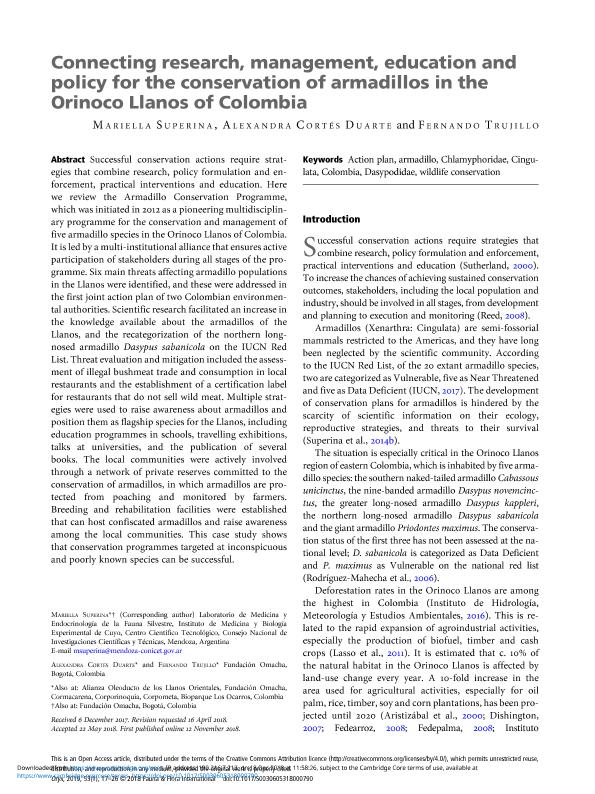Mostrar el registro sencillo del ítem
dc.contributor.author
Superina, Mariella

dc.contributor.author
Cortés Duarte, Alexandra
dc.contributor.author
Trujillo, Fernando
dc.date.available
2020-12-02T20:26:05Z
dc.date.issued
2019-01
dc.identifier.citation
Superina, Mariella; Cortés Duarte, Alexandra; Trujillo, Fernando; Connecting research, management, education and policy for the conservation of armadillos in the Orinoco Llanos of Colombia; Cambridge University Press; Oryx; 53; 1; 1-2019; 17-26
dc.identifier.issn
0030-6053
dc.identifier.uri
http://hdl.handle.net/11336/119672
dc.description.abstract
Successful conservation actions require strategies that combine research, policy formulation and enforcement, practical interventions and education. Here we review the Armadillo Conservation Programme, which was initiated in 2012 as a pioneering multidisciplinary programme for the conservation and management of five armadillo species in the Orinoco Llanos of Colombia. It is led by a multi-institutional alliance that ensures active participation of stakeholders during all stages of the programme. Six main threats affecting armadillo populations in the Llanos were identified, and these were addressed in the first joint action plan of two Colombian environmental authorities. Scientific research facilitated an increase in the knowledge available about the armadillos of the Llanos, and the recategorization of the northern long-nosed armadillo Dasypus sabanicola on the IUCN Red List. Threat evaluation and mitigation included the assessment of illegal bushmeat trade and consumption in local restaurants and the establishment of a certification label for restaurants that do not sell wild meat. Multiple strategies were used to raise awareness about armadillos and position them as flagship species for the Llanos, including education programmes in schools, travelling exhibitions, talks at universities, and the publication of several books. The local communities were actively involved through a network of private reserves committed to the conservation of armadillos, in which armadillos are protected from poaching and monitored by farmers. Breeding and rehabilitation facilities were established that can host confiscated armadillos and raise awareness among the local communities. This case study shows that conservation programmes targeted at inconspicuous and poorly known species can be successful.
dc.format
application/pdf
dc.language.iso
eng
dc.publisher
Cambridge University Press

dc.rights
info:eu-repo/semantics/openAccess
dc.rights.uri
https://creativecommons.org/licenses/by-nc-sa/2.5/ar/
dc.subject
ACTION PLAN
dc.subject
ARMADILLO
dc.subject
CHLAMYPHORIDAE
dc.subject
CINGULATA
dc.subject
COLOMBIA
dc.subject
DASYPODIDAE
dc.subject
WILDLIFE CONSERVATION
dc.subject.classification
Conservación de la Biodiversidad

dc.subject.classification
Ciencias Biológicas

dc.subject.classification
CIENCIAS NATURALES Y EXACTAS

dc.title
Connecting research, management, education and policy for the conservation of armadillos in the Orinoco Llanos of Colombia
dc.type
info:eu-repo/semantics/article
dc.type
info:ar-repo/semantics/artículo
dc.type
info:eu-repo/semantics/publishedVersion
dc.date.updated
2020-11-18T16:45:37Z
dc.journal.volume
53
dc.journal.number
1
dc.journal.pagination
17-26
dc.journal.pais
Reino Unido

dc.journal.ciudad
Cambridge
dc.description.fil
Fil: Superina, Mariella. Consejo Nacional de Investigaciones Científicas y Técnicas. Centro Científico Tecnológico Conicet - Mendoza. Instituto de Medicina y Biología Experimental de Cuyo; Argentina
dc.description.fil
Fil: Cortés Duarte, Alexandra. Fundación Omacha; Colombia
dc.description.fil
Fil: Trujillo, Fernando. Fundación Omacha; Colombia
dc.journal.title
Oryx

dc.relation.alternativeid
info:eu-repo/semantics/altIdentifier/url/https://www.cambridge.org/core/journals/oryx/article/connecting-research-management-education-and-policy-for-the-conservation-of-armadillos-in-the-orinoco-llanos-of-colombia/05312F1475C7CA46C236DC7FFE1B49A2
dc.relation.alternativeid
info:eu-repo/semantics/altIdentifier/doi/http://dx.doi.org/10.1017/S0030605318000790
Archivos asociados
